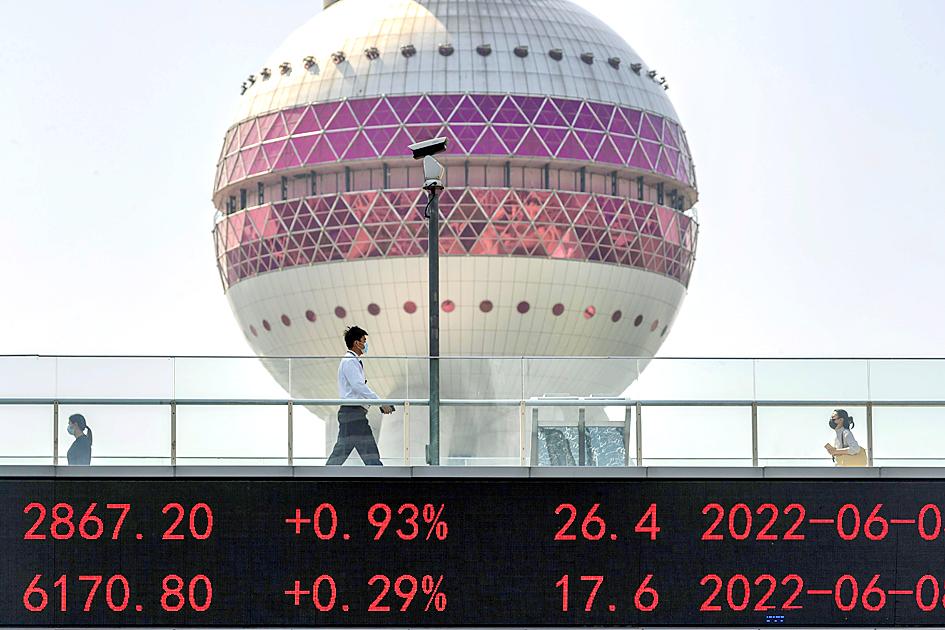Shanghai tomorrow is to lock down a district of 2.7 million people to conduct mass testing for COVID-19, city authorities said yesterday, as the Chinese metropolis struggles to fully emerge from punishing curbs.
The city eased many restrictions last week, after confining most of its 25 million residents to their homes since March as China battled its worst COVID-19 outbreak in two years.
However, the lockdown was never fully lifted, with hundreds of thousands in China’s biggest city still restricted to their homes and multiple residential compounds put under fresh stay-at-home orders.

Photo: EPA-EFE
The southwestern district of Minhang, home to 2.7 million people, would be placed under “closed management” tomorrow morning and all residents would be tested, district authorities said in a social media post.
“The closure would be lifted after the samples have been collected,” they said, without giving a specific time or date.
The statement also did not say what measures would be imposed if any district residents test positive.
Under China’s “zero COVID-19” approach, all positive cases are isolated and close contacts — often including the entire building or community where they live — are made to quarantine.
Shanghai reported nine new local infections yesterday, with none of them in Minhang.
The district’s announcement sparked fear among some social media users that the lockdown could be prolonged if any cases are found.
“You need to clarify if [the lockdown] will really be lifted after samples are collected,” one person wrote.
“If there are abnormal results after the tests, what will you do? Continue the lockdown?” another asked.
The city government denied rumours that the rest of the city would lock down again in phases, saying that while individual areas had issued confinement orders, the city as a whole was “gradually resuming normal production and life.”
The lockdown in Shanghai — a major global shipping hub — had threatened to pile further pressure on already-strained international supply chains.
However, the city has slowly come back to life in the past few days.
Commuters are back on subways and buses as people return to working in their offices, while residents have gathered in parks and along the city’s waterfront.
However, others are chafing under continued restrictions, with residents in one compound in Xuhui District protesting against the rules this week.

MONEY GRAB: People were rushing to collect bills scattered on the ground after the plane transporting money crashed, which an official said hindered rescue efforts A cargo plane carrying money on Friday crashed near Bolivia’s capital, damaging about a dozen vehicles on highway, scattering bills on the ground and leaving at least 15 people dead and others injured, an official said. Bolivian Minister of Defense Marcelo Salinas said the Hercules C-130 plane was transporting newly printed Bolivian currency when it “landed and veered off the runway” at an airport in El Alto, a city adjacent to La Paz, before ending up in a nearby field. Firefighters managed to put out the flames that engulfed the aircraft. Fire chief Pavel Tovar said at least 15 people died, but

LIKE FATHER, LIKE DAUGHTER: By showing Ju-ae’s ability to handle a weapon, the photos ‘suggest she is indeed receiving training as a successor,’ an academic said North Korea on Saturday released a rare image of leader Kim Jong-un’s teenage daughter firing a rifle at a shooting range, adding to speculation that she is being groomed as his successor. Kim’s daughter, Ju-ae, has long been seen as the next in line to rule the secretive, nuclear-armed state, and took part in a string of recent high-profile outings, including last week’s military parade marking the closing stages of North Korea’s key party congress. Pyongyang’s official Korean Central News Agency (KCNA) released a photo of Ju-ae shooting a rifle at an outdoor shooting range, peering through a rifle scope

South Korea would soon no longer be one of the few countries where Google Maps does not work properly, after its security-conscious government reversed a two-decade stance to approve the export of high-precision map data to overseas servers. The approval was made “on the condition that strict security requirements are met,” the South Korean Ministry of Land, Infrastructure and Transport said. Those conditions include blurring military and other sensitive security-related facilities, as well as restricting longitude and latitude coordinates for South Korean territory on products such as Google Maps and Google Earth, it said. The decision is expected to hurt Naver and Kakao

India and Canada yesterday reached a string of agreements, including on critical mineral cooperation and a “landmark” uranium supply deal for nuclear power, the countries’ leaders said in New Delhi. The pacts, which also covered technology and promoting the use of renewable energy, were announced after Indian Prime Minister Narendra Modi and Canadian Prime Minister Mark Carney hailed a fresh start in the relationship between their nations. “Our ties have seen a new energy, mutual trust and positivity,” Modi said. Carney’s visit is a key step forward in ties that effectively collapsed in 2023 after Ottawa accused New Delhi